Updated: August 29, 2025
Written by Adam Graham
Adam Graham is a construction industry analyst with experience writing about home construction, interior design, and real estate. As a former member of the Fixr.com editorial team, he collaborated with industry experts and journalists to ensure accurate, up-to-date information for homeowners. His work has been featured in publications such as Better Homes and Gardens, the National Association of Realtors, and Insurance News Net Magazine.
Learn moreReviewed by Adam Graham
Kitchen countertops come in a wide range of colors, styles, and materials. For those who like the look and feel of natural materials like stone, there are several different choices. While granite was once the most popular material available, followed closely by marble, quartzite is now making significant inroads into the popularity for kitchen and bathroom countertops.
Quartzite is a natural stone that is harder and more durable than granite and comes in many of the same colors and patterns as marble. Like other stones, costs depend on availability, where it is quarried, and the edging, finish, and layout of your countertop design. This creates a wide range of costs for the material.
The national average cost for quartzite installations is between $3,600 and $4,950, with most homeowners spending around $4,200 for 30 sq.ft. of Fantasy Macaubas quartzite with a bullnose edge and undermount sink. The low cost for this project is $960 for 12 sq.ft. of Super White quartzite for a bathroom vanity with an eased edge and drop-in sink. This project’s high cost is $6,300 for 30 sq.ft. of Taj Mahal quartzite with an ogee edge and two undermount sinks.
Quartzite Countertops Price
| Cost to Install Quartzite Countertops | |
| National average cost | $4,200 |
| Average range | $3,600-$4,950 |
| Low-end | $960 |
| High-end | $6,300 |
Quartzite Countertops Cost per Square Foot
Quartzite countertops have a wide range of costs per square foot, depending on the stone and type of finish, edge, and fabrication. The material ranges from $50 to $120 a square foot, while fabrication costs $30 to $90 a square foot, for a total range of $80 to $210 a square foot on average. There may be additional charges to this, including specialty edge treatments, finishes, and sink cutouts.
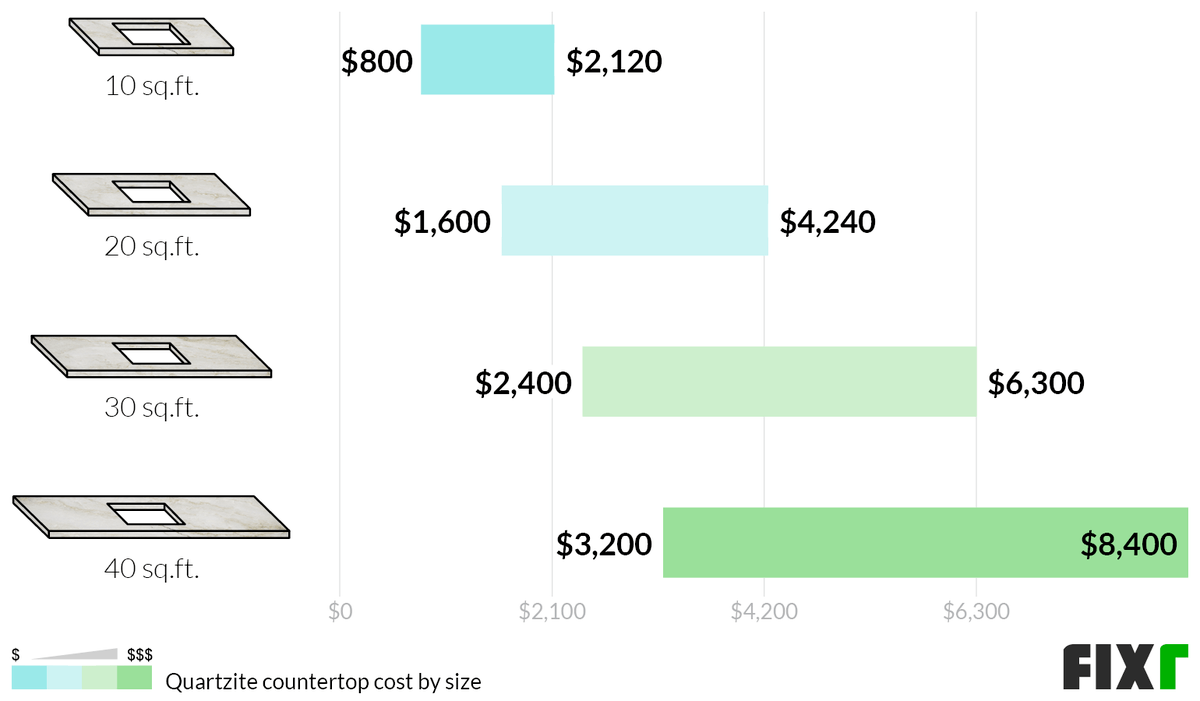

| Countertop Size | Average Costs (Installed) |
| 10 sq.ft. | $800 - $2,120 |
| 20 sq.ft. | $1,600 - $4,240 |
| 30 sq.ft. | $2,400 - $6,300 |
| 40 sq.ft. | $3,200 - $8,400 |
Quartz vs Quartzite Countertops
Quartz and quartzite countertops sound a lot alike, but they are two very different materials. Quartz countertops are a man-made material containing roughly 93% natural quartz stone that is mixed with pigments and resins. This means you have a lot of control over the way the slabs look while also having a wide range of colors, patterns, and styles. The resins make the slabs more flexible and also virtually maintenance-free.
Quartzite is a natural metamorphic stone. It is made when sandstone containing heavy amounts of quartz undergoes enormous amounts of heat and pressure. The resulting stone is a 7 on the Mohs scale - the hardest natural material used in home products. This material can have a lot of the same natural coloring and veining as marble, and in some cases, it can be virtually indistinguishable from marble. The difference is that while marble etches and stains easily, quartzite does not etch and only minimally stains.
Both quartz and quartzite have a wide range of costs, depending on the color, finish, and fabrication. However, quartzite is generally more expensive because it needs to be quarried, cut, and polished. Quartz is made in a mold.


| Material | Average Costs per Sq.Ft. (Installed) |
| Quartz | $40 - $100 |
| Quartzite | $80 - $210 |
Quartzite Countertop Price by Location
Quartzite is a beautiful stone that is very durable and much lower in maintenance than either granite or marble. Quartzite has the look and beauty of natural stone, as well as the color and variation. But because it is easier to take care of, you can install it in more places without worrying that it may be damaged or difficult to care for. This material comes in slabs like marble, granite, and quartz countertops. This means that it can be cut and shaped to fit any installation, no matter its size or location. It can be installed anywhere, with kitchens, mudrooms, and bathrooms being the three most common areas. Costs depend on the installation size, stone type, and how you have it finished. Below are the average costs to install it in the bathroom, mudroom, and kitchen, based on the average sizes of countertops in these areas.


| Location | Average Costs (Installed) |
| Bathroom | $480 - $2,520 |
| Mudroom | $560 - $2,520 |
| Kitchen | $2,400 - $8,400 |
Quartzite Bathroom Countertops
The cost of installing quartzite countertops in the bathroom is between $480 and $2,520. The average countertop size in the bathroom ranges from 6 to 12 sq.ft. However, it is possible to have smaller countertops or much larger ones. In either case, your costs could be different. Quartzite makes a beautiful addition to bathrooms. It can be used not only on the countertop but also as a threshold for the room or shower. Using it to create tub decks or shower seats creates a cohesive look for the entire room.
Quartzite Mudroom Countertops
The cost of installing quartzite in the mudroom averages $560 to $2,520. This assumes your mudroom countertop ranges between 42” and 72” in length. If your countertops are larger or smaller in size, your costs could be different. Quartzite will need slightly more care in the mudroom than in some other areas. This is because things like road salt that may be brought in from the outdoors could harm its surface. However, it will hold up well to the everyday cleaning and moisture that a mudroom sees.
Quartzite Kitchen Countertops
The cost of installing quartzite in the kitchen averages $2,400 to $8,400. Most kitchens have around 30 sq.ft. of countertops, with some having up to 40 sq.ft. There are smaller galley kitchens and others that are larger with peninsulas and islands that require additional countertops. In either case, your costs could be different. Quartzite makes a great choice for kitchen countertops. It is much less likely to stain or etch than marble, and it is harder than granite. It is not affected by hot pots, and it is etch, stain, and chip-resistant.
Quartzite Slab Cost
Quartzite is a natural stone that is quarried in very large slabs. These slabs are rough cut and given a polished surface before being sent to a fabricator or stone yard. From there, they are further cut and finished into the shape of your countertop.
A few fabricators and stone yards will have smaller slabs on hand for very popular materials. These may cost slightly less and make a good choice for bathroom vanities. However, most quartzite is only available in large slab format.
The exact cost of a quartzite slab depends on several things, including the color, its rarity or uniqueness, its size, and where it is from. Most quartzite slabs cost between $50 and $120 a square foot. The average slab size is roughly 120 inches by 77 inches, making the average cost of an entire slab between $3,200 to $7,680. Some projects only require one slab, others require less than one slab, and some require two slabs.
Quartzite Countertops Cost by Color
Like all natural stones, quartzite comes in many different hues and variations. The predominant colors are white, gray, and beige, but it is possible to find shades of red, green, blue, and brown. The more vivid the color, the higher the cost tends to be. It is generally given a name by the quarry that produces it. You can find many of these stones at multiple stone yards, making it easy to shop around for a better price. However, no two slabs are the same due to the nature of the material. For that reason, always see the slab in person to make sure it is what you want for your project.

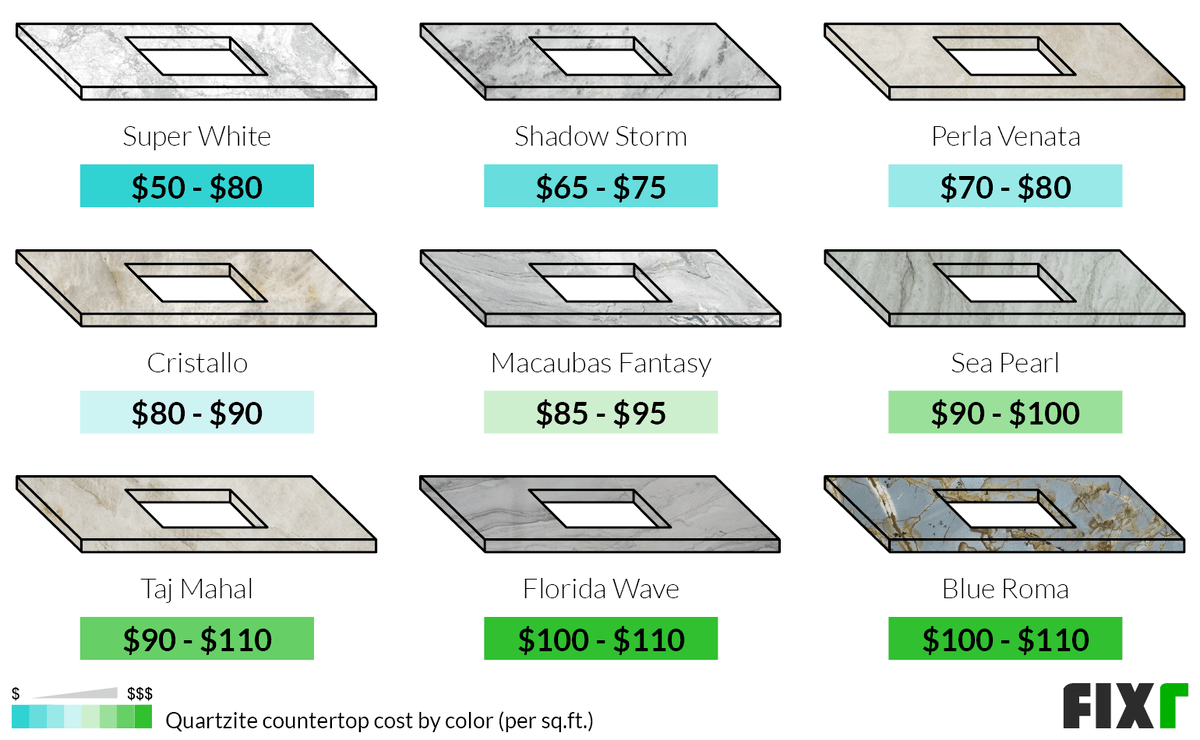
| Color | Average Costs per Sq.Ft. (Material Only) |
| Super White | $50 - $80 |
| Shadow Storm | $65 - $75 |
| Perla Venata | $70 - $80 |
| Cristallo | $80 - $90 |
| Macaubas Fantasy | $85 - $95 |
| Sea Pearl | $90 - $100 |
| Taj Mahal | $90 - $110 |
| Florida Wave | $100 - $110 |
| Blue Roma | $100 - $110 |
Super White Quartzite
The cost of Super White quartzite ranges from $50 to $80 a square foot. Super White is sometimes sold as a marble, although it is technically a quartzite. This stone has a pure white background with a light-to-medium gray vein pattern. Lower-cost stones usually have more gray veining. The higher-cost stones tend to be more pure white with less veining. This is a good choice for anyone who wants a white kitchen countertop because it is less likely to develop problems over time the way marble does. It is also more durable than white granites.
Shadow Storm Quartzite
Shadow Storm quartzite averages $65 to $75 a square foot. Shadow Storm is a white and gray stone with a fractured pattern rather than a lot of veining. It can have a sparkling texture that is common with quartzites. It may have yellow or light brown tones mixed in as well. This stone can be very dramatic in appearance, with a lot of movement and personality. It is sometimes sold as granite.
Perla Venata Quartzite
The cost of Perla Venata quartzite is $70 to $80 a square foot. Perla Venata is a very light, creamy taupe. It has an angular grain pattern that is a darker brown shade. The veins tend to move in groups of clusters across the slab, giving it a lot of movement and energy. Some slabs also have white veining. It is quarried in Brazil and is almost exclusively sold as a 3-cm slab.
Cristallo Quartzite
The cost of Cristallo quartzite ranges from $80 to $90 a square foot. Cristallo is a very rich, dramatic-looking stone. It is quarried in Brazil and categorized as a gold-colored stone. The background is a light, creamy gold, but the veining can range in very dramatic colors. The veins can be bright red, brick, and burgundy in hue, as well as darker gold sections. The veins run through the entire slab in all directions, so it has a wild appearance. This type is more frequently found in 2-cm slabs rather than 3-cm.
Macaubas Fantasy Quartzite
The cost of Macaubas Fantasy quartzite averages $85 to $95 a square foot. Macaubas Fantasy is a mixture of gray, white, and blue colors. It has a soft light-gray background with darker gray, white, and blue veins. The exact colors and hues can change a lot within one slab and from slab to slab. The more blue the slab contains, the higher its cost tends to be. This slab varies from having small, subtle veins to very dramatic and prominent veins. It also has a slightly glittering surface texture.
Sea Pearl Quartzite
The cost of Sea Pearl quartzite is between $90 and $100 a square foot. Sea Pearl is frequently categorized as a gray, green, and white stone. It has a light creamy background color that ranges from white to a slightly green color, depending on the slab. The veins are a mixture of gray, tan, brown, gold, and sometimes a deeper green. The veins are very delicate, with a swirling pattern. This stone has a lot of very quiet movement, making it less dramatic than other quartzites.
Taj Mahal Quartzite
Taj Mahal Quartzite ranges from $90 to $110 a square foot. Taj Mahal is a taupe-colored stone that handles different finishes very well. It is common to find slabs that have been honed or leathered, meaning there are no additional finishing fees. Taj Mahal can have white, gray, and gold veining in a variety of patterns. Some stones are fairly quiet, while others have very dramatic color and veining. Stones with a different finish or a lot of color and movement cost the most.
Florida Wave Quartzite
The cost of Florida Wave Quartzite is $100 to $110 a square foot. Florida Wave is a white and gray stone that can look similar to Bianco Carrara marble. It has a soft light-gray background with white, dark gray, and black veining. The veins are often small and subtle, giving the quartzite the look of a soft marble. At times, the darker black veining becomes very dramatic. It has a more glittering surface texture than true marble.
Blue Roma Quartzite
The cost of Blue Roma quartzite averages $100 to $110 a square foot. Blue Roma is a stunning, dramatic stone. It has a soft blue-gray background that looks best when polished. It has gold, red, and black veins running through the surface in an open circular pattern. This stone has a lot of movement and makes a very dramatic statement anywhere it is installed. It makes a good choice for an island countertop where its dramatic veining can be seen.
Quartzite Countertop Price by Finish
Like all natural stone countertops, quartzite can have different finishes on its surface. These change how the material reflects light, which can make the colors brighter or duller or create a different surface texture on the stone.
The majority of quartzite countertops are polished. It is possible to have a honed or leathered finish put on later for an additional cost. Some very popular quartzites are readily available with any finish. This can be a slightly less expensive way to get a different finish rather than having a polished slab honed or leathered on demand. If you choose to have a new finish put on, there is usually an extra charge per square foot.


| Finish | Average Costs per Sq.Ft. |
| Polished | No Additional Charge |
| Honed (Matte) | $10 - $20 |
| Leathered | $15 - $25 |
Polished Quartzite Countertops
Polished is the default finish for quartzite countertops, meaning the slabs are usually polished when you view them. There is no additional charge for this finish. Polishing means creating a glossy, reflective surface on the stone by grinding down the surface using progressively finer grits. It can disguise minor flaws in the stone’s surface and brighten and heighten the stone color, making it look darker.
Honed Quartzite Countertops
The cost to hone your quartzite countertops is an additional $10 to $20 per square foot. Honing is a matte finish. It is actually the final stage of the polishing process before they apply the final grit that produces the reflective finish. Honed stones are slightly lighter in color. They are smooth to the touch and may show slight marks or imperfections in the stone. These are not considered flaws, but they simply become more visible without the light reflecting off the surface.
Leathered Quartzite Countertops
Adding a leathered finish to your quartzite countertops costs an additional $15 to $25 per square foot. Leathering adds a surface texture to your countertops. While polished and honed countertops are perfectly smooth, leathered countertops have small hills and valleys. This texture is both visible and tactile, although it is very subtle on most stones. It can add a bit of shadow and depth to the countertops. The leathered finish is not reflective, but it can disguise small imperfections or marks in the stone that honing may expose.
Quartzite Countertop Edge Options
Quartzite countertops are usually given a square or eased edge as a default at no additional cost. However, if you want a different edge, this can be easily applied to any countertop. Edges range from contemporary to traditional, with a variety of profiles available. The more sculpted the edge, the more expensive they tend to be. Edges are charged per linear foot.


| Edge | Average Costs per Linear Foot |
| Square | No Additional Charge |
| Eased | No Additional Charge |
| Half Bullnose | $10 - $12 |
| Full Bullnose | $10 - $12 |
| Bevel | $10 - $12 |
| Ogee | $20 - $25 |
| Dupont | $20 - $25 |
| Mitre | $20 - $25 |
| Quirk | $20 - $25 |
| French Cove | $30 - $35 |
| Double Bevel | $36 - $40 |
| Dupont Square | $36 - $40 |
| Cole Smith | $36 - $40 |
Quartzite Countertops Installation Cost
The average cost to install quartzite countertops is between $30 and $90 a square foot. This includes taking a template of your cabinets, fabricating the slabs, transporting them to your location, and installing them. In most cases, it also includes the cost of removing and disposing of your old countertops.
You may have additional costs for different edge treatments, cutouts for sinks and cooktops, and their installation. Costs vary by fabricator, the distance they travel, and the shape of your cabinets. For 30 sq.ft., the installation costs are between $900 and $2,700 out of the $4,200 average.
Maintenance
For a natural stone, quartzite is fairly low-maintenance, but it is a natural material that needs some care to look its best. Quartzite resists etching and staining, and some stones may not etch or stain at all. To determine the level of care your stone will need, perform the lemon-and-water test first.
Take a small piece of leftover stone - the sink cutout piece is a good option for this. Pour a small amount of lemon juice and water onto the stone and leave them for an hour. When you wipe them away, if you see changes in the stone, it will need additional care.
If the lemon juice left a mark, the stone will etch. To care for it, use a pH-neutral cleaner or one designed for stone. Wipe up spills containing acids as soon as possible.
If the water darkens the stone, it has the potential to stain. To care for it, apply a silicone-based impregnating sealer to the stone about once a year to help impede staining. Wash with a pH-neutral cleaner as needed and wipe up spills as soon as you can.
Pros and Cons
Quartzite is a beautiful, durable material that makes a great addition to many kitchens and bathrooms. It resists stains, etching, and chipping better than granite and marble. It also resists heat better than quartz countertops, making it one of the lowest maintenance options for natural stone.
It is a natural material, meaning it varies in color from piece to piece and within one piece. Always examine the slabs carefully when choosing to ensure you like the color variation. It may have small fissures or pits in its surface. These are not flaws but are part of the stone. Honing the stone may uncover them. While it resists etching and staining, it requires some care because etching and staining may still be possible. And quartzite can be more expensive than other types of natural stone and quartz.
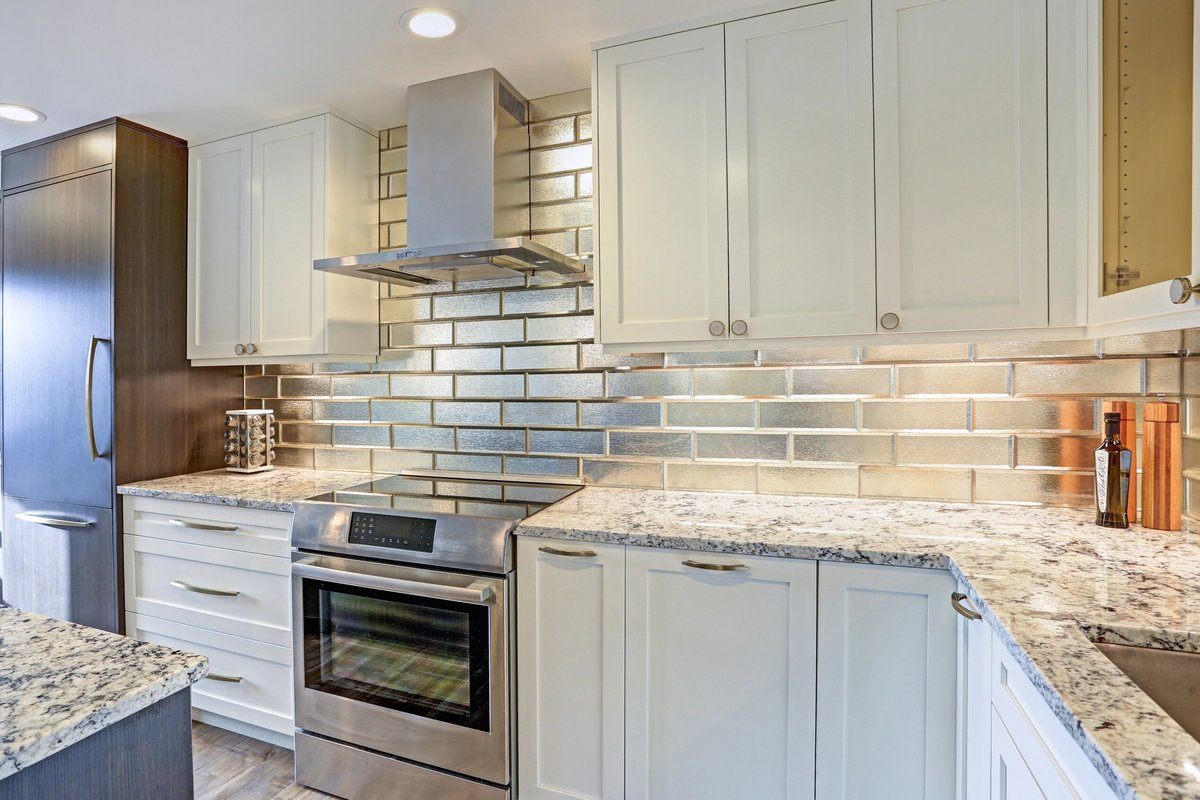
Quartzite vs Granite Countertops
Quartzite and granite are both natural stone countertops. They each contain at least some natural quartz, but that is where the similarities end. Granite is an igneous stone, which contains quartz, silica, feldspar, and mica. It is formed from molten lava and can contain many different varying quantities of its main minerals, as well as others that can impact its color and texture. Quartzite is a metamorphic stone made of transformed sandstone that had a high quartz content. The sandstone was put under enormous amounts of heat and pressure to become a much denser, harder, and more durable stone.
Of the two, quartz is stronger, more durable, and less porous. Many stones on the market are sold as granite, but they are really a variety of other stones, including dolomites, gabbros, and conglomerate stones. Therefore, granite has a wide range of porosity and issues with strength, staining, and etching.
Quartzite is much more consistent. While some stones are harder than others, the makeup does not vary nearly as much. This means you are more likely to know what you are getting with quartzite than with granite. The color of quartzite is not consistent, however. Like granite, you need to choose the exact slab you want for your home because it can vary tremendously from samples.
Of the two, quartzite is more expensive. Below are the average costs for 30 sq.ft. of each material fully installed.
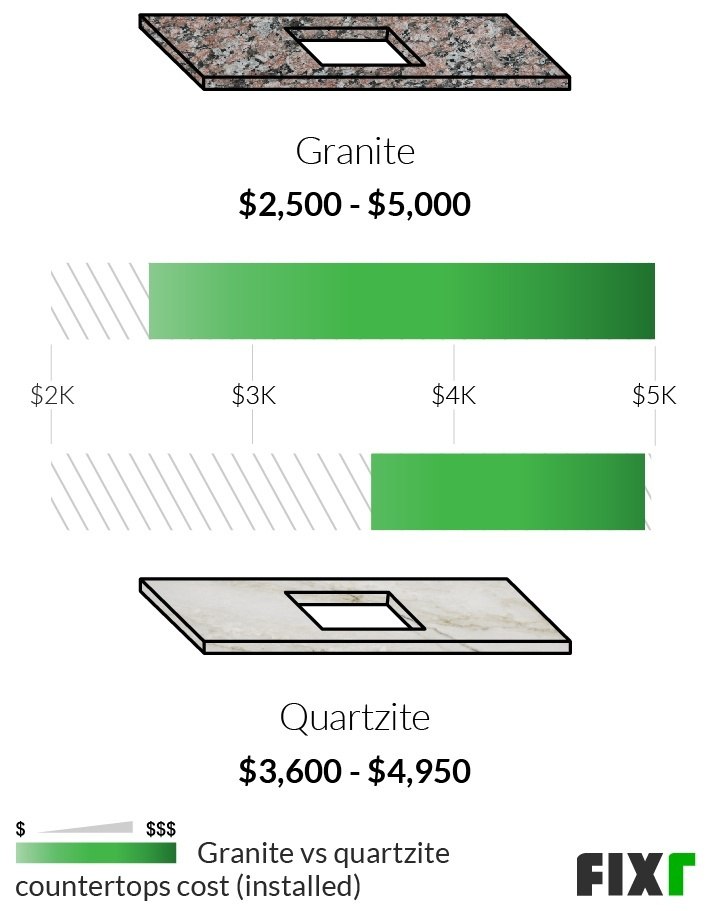

| Material | Average Costs (Installed) |
| Granite | $2,500 - $5,000 |
| Quartzite | $3,600 - $4,950 |
Quartzite vs Marble Countertops
Both marble and quartzite countertops are made from natural metamorphic stone. But while marble was made from metamorphosed limestone and contains mostly calcite, quartzite is made from metamorphosed sandstone and contains mostly quartz. This means that while marble is a 4 on the Mohs hardness scale, quartzite is a 7, meaning much more durable than marble. From a daily use standpoint, quartzite will be less likely to stain, scratch, or discolor over time than marble.
Both materials have similar color ranges and vein patterns. But marble etches and stains - sometimes dramatically - when used as a countertop, while quartzite resists these issues. This makes quartzite much lower in maintenance than marble. The biggest difference in appearance is that quartzite tends to have a glittering, almost sugary, appearance to its texture beneath the polished surface. Marble is much smoother and more consistent in appearance. Both need to be selected in person becuase they can vary a lot from samples.
The two materials have a lot of overlap in costs, but quartzite can be more expensive. Below are the average costs for 30 sq.ft. of each material fully installed.
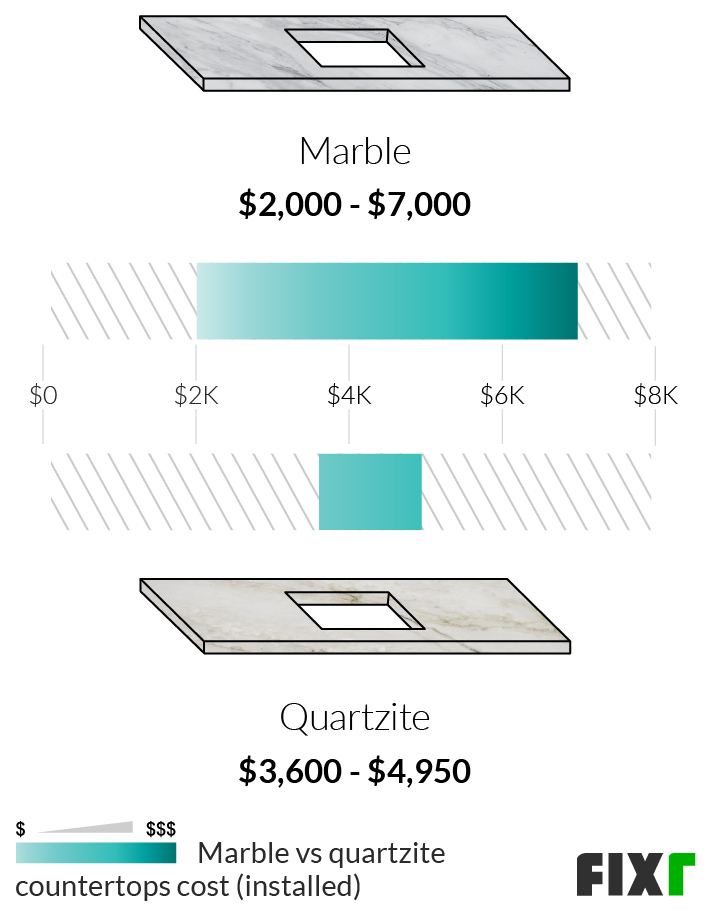

| Material | Average Costs (Installed) |
| Marble | $2,000 - $7,000 |
| Quartzite | $3,600 - $4,950 |
Quartzite vs Porcelain Countertops
Another popular low-maintenance material for countertops is porcelain. Porcelain is a man-made material created from clay dust. The dust is compressed together tightly, and then fired to extremely high temperatures, making the countertops incredibly durable as well as non-porous. Quartzite countertops in contrast are made from natural materials. They are very durable but are somewhat porous, and some types may need to be sealed, while porcelain does not.
Porcelain countertops tend to be thinner than quartzite countertops. You can build up the edge to make them appear thicker, but at the sink and other areas, you can see how thin they are in comparison to a stone slab like quartzite.
Porcelain comes in several colors and styles and can mimic stone. It is more sedate in pattern and color, while quartzite tends to be more dramatic and have a lot more variation in color and veining.
Of the two, porcelain is much less expensive than quartzite. Below are the average costs for installing 30 sq.ft. of each material.


| Material | Average Costs (Installed) |
| Porcelain | $1,750 - $3,600 |
| Quartzite | $3,600 - $4,950 |
Enhancement and Improvement Costs
Cooktop Installation
You can have a cooktop undermounted underneath the quartzite countertop. This costs $200 for the cooktop cutout. In addition, you have costs of between $500 and $1,000 for the cooktop and its installation.
Old Countertop Removal
When replacing your current countertops with quartzite, you must remove the old countertop. Most fabrication and installation companies include this in the project cost. However, others charge between $50 and $200 to remove and dispose of the old countertop.
Sink Installation
You will have an additional charge of around $100 for each cutout in the countertop for a sink. This is in addition to the cost of the sink and installation, which is around $400.
Cabinetry Installation
You can have new cabinets installed to completely update your kitchen. Your cabinets must be installed before the template can be made for your new countertop. New kitchen cabinets average $6,450.
Backsplash Installation
Replacing your countertops is a great time to update your backsplash. Backsplashes can coordinate with your countertop to complete the look of the room. The average cost of a new backsplash installation is around $1,500.
Island Installation
Kitchen islands make a great addition to your workspace. They come in many shapes and sizes, and you can use the same countertop or something coordinating. The cost of a new island installation averages $5,500.
Additional Considerations and Costs
- Backsplash. If your installer also handles backsplashes, check with them to see if there are any discounts for having both the countertop and backsplash done together. This can be more cost-effective than having two separate jobs.
- Popularity. Quartzite is a very popular material for kitchen countertops. Installing it can make your home easier to sell and, in some areas, may increase the value.
- Sealing. Quartzite resists staining and etching, but it is not impervious. If your countertop fails the water absorption part of the water-and-lemon test, it should be sealed to help impede staining.
- Seams. Speak to your fabricator about the seams and how the veining of your slabs may match up. If possible, see if they can match the ends so that the veins do not make a dramatic departure from one another.
- Delivery fees. Most installation costs include the transportation and delivery fees of your new countertop. Always check with the fabricator to make sure, however.
- Interior designer. If you need help coordinating your new countertop with the rest of your kitchen, an interior designer can help.
FAQs
- How do you remove stains from quartzite countertops?
If your quartzite is stained, you can use a poultice to help bring the stain up to the surface, where it can be wiped away. Check at your local hardware store for a stone poultice.
- What is the durability of quartzite vs quartz?
Quartz and quartzite are both very durable. In some ways, quartzite may be more durable because the resins used in creating quartz can make it flexible. This means quartz is more likely to dent or melt slightly from a very hot pot.
- Is quartzite good for kitchen countertops?
Quartzite makes an excellent countertop for kitchens. It resists staining and etching better than other stone countertops.
- Can I put a hot pan on quartzite?
Yes, you can put a hot pan on quartzite because it is a metamorphic stone that was created under enormous amounts of heat and pressure, so it resists heat damage.
- What should you not use on quartzite countertops?
Do not use a high-acid or high-alkaline cleaner on your quartzite. You should also avoid cutting on it because it may dull your knives.
- Do you need to seal quartzite countertops?
This depends on the quartzite. A few do not require it, but most benefit from an impregnating sealer to help impede staining.
- Does quartzite stain easily?
No, quartzite resists staining. If you are concerned, use an impregnating sealer to help impede stains.
